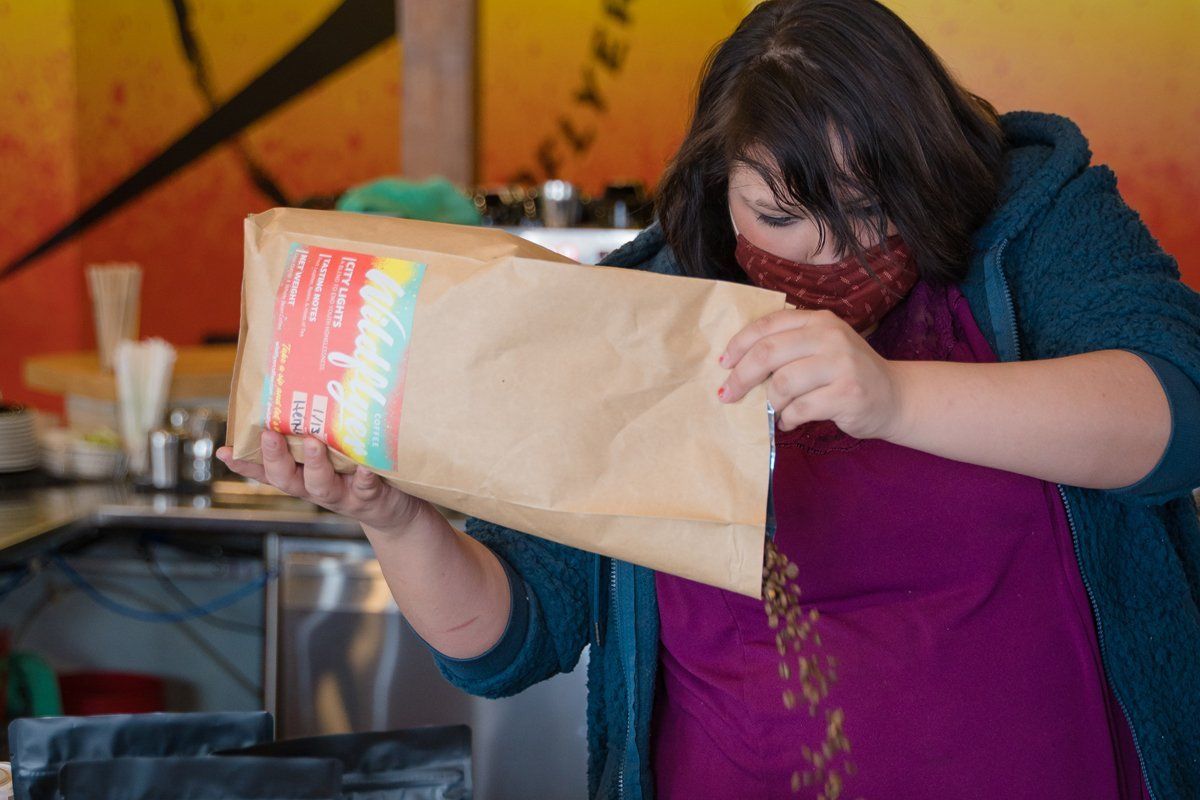Valarie Mckenzie struggled to control her anger early in her life and was kicked out of her home at 18. She roamed everywhere from Grand Rapids, Michigan to Atlanta, Georgia, but spent most of her time living in downtown Minneapolis, where she slept on public benches and in bus shelters. The city's unrelenting bright lights, which she constantly tried to escape, reminded her of exactly what she lacked: a safe and warm place to sleep at night.
Late last summer, when she was 24, things began to change for Mckenzie. An outreach worker introduced her to Carley Kammerer, the executive director of Wildflyer Coffee, who offered Mckenzie a job that enabled her to secure stable housing. She had worked odd jobs before, but nothing consistent.
"It's the job, not even really the income, that made the difference," Mckenzie says. "It was mostly the stability," she says, that helped her transition out of homelessness.
It's exactly this structure and stability, paired with an environment that's empathetic to the unique struggles faced by the roughly 13,000 young people experiencing homelessness in Minnesota every year, that Kammerer has sought to provide. She started the business in 2017, after years of working as a social worker.
As of 2019, there are more than 35,000 homeless youth in the U.S., with an additional 550,000 young people between 18 and 24 experiencing homelessness for longer than a week. Most often this is a result of family conflict coupled with poverty, mental health, substance abuse, and other contributing factors. The pandemic has hit homeless youth especially hard, as already limited access to hygiene and shelter resources has become further strained by social distancing measures and school closures.
"I had been working with youth experiencing homelessness for about eight years in different capacities," Kammerer says. "I saw the same youth cycling through drop-in centers and outreach programs, and there wasn't seemingly a lot of traction to get them out of that cycle."
Valarie Mckenzie brews an espresso at Wildflyer Coffee. (Photo courtesy of Wildflyer Coffee)
Since Kammerer's parents owned a coffee shop when she was growing up in Wisconsin and she had roughly 10 years of barista experience herself, she decided to start a coffee business to help address the problems she was seeing in the youth with whom she worked. Her goal was to run a business that would meet homeless youth where they are, offering flexibility and understanding while fostering the soft skills and customer service-focused development that would help them meet the demands of the job market.
Developing a business model — and a vision
Wildflyer isn't the first coffee shop to focus on homeless youth. Kammerer looked at other examples, like Purple Door in Denver (where she briefly interned), Street Bean in Seattle, and The Monkey & The Elephant in Philadelphia, and saw an opportunity to do things a little differently in terms of the length of the program and the soft-skills training focus.
She spoke with other social workers and case managers to understand what was working and what wasn't when homeless youth tried to get and maintain jobs, and she used their insights to develop Wildflyer's six-month program. By offering extensive training and real-time coaching when issues on the job arise, the program is designed to help bridge the gap between life on the street and entry-level positions.
"I was seeing a lot of youth get jobs and then lose them," Kammerer says, largely due to challenges that stem from homelessness, ranging from transportation issues to accessing and storing important documents like birth certificates, which are required to establish employment.
With homelessness also comes a lack of access to resources for maintaining personal hygiene, so sometimes youth will miss work because they're embarrassed to come in after not having showered for a few days, Kammerer says. Sometimes the mental health challenges become too much and getting to work, much less on time, can seem impossible.
Read more Civil Eats: 'Minari' Shines a Spotlight on Asian American Farmers
When Kammerer first established Wildflyer, the organization employed four to six young people to sell simple pour-over and iced Dogwood Coffee drinks at local farmers' markets each season, where training was more ad hoc. It has since secured a brick and mortar location and is in the process of expanding both its coffee service and its training program.
"Youth don't always know how to do well at time management, customer service, and dealing with managers professionally," Kammerer says. When she founded the café, she asked: "What if we knew what we were getting into and planned ways to handle skill development rather than fire them?" Now, that's exactly what she's working to create.
Rather than adding a roasting component like the one at Purple Door, Kammerer decided to keep the focus on customer-facing barista jobs so they can practice what they're learning in training.
When challenges arise, Kammerer and her team talk through them with the youth employees, focusing on causes and potential future solutions. With her social work background and contacts, she's also able to connect youth to services and resources to help stabilize their situations.
For Mckenzie, that flexibility and understanding have made all the difference. "Carley and the shift leads and the shop manager are all very understanding of mental health and the struggles I go through," she says. "They're a big support."
Building out the program
Wildflyer's new brick-and-mortar coffee shop opened in December on Minnehaha Avenue — a stone's throw from the civil unrest that coalesced around Minneapolis's third precinct in the days that followed George Floyd's death at the hands of ex-Minneapolis Police Officer Derek Chauvin.
The location was previously home to Peace Coffee, a local roaster dedicated to fair trade practices that exited the retail business after the pandemic led owner and CEO Lee Wallace to focus only on wholesale. Now, Wildflyer has taken over the space and will continue to sell and brew Peace Coffee along with Dogwood Coffee.
(Photo courtesy of Wildflyer Coffee)
"In 2020, we were able to sell 17% more coffee than we did in 2019 despite losing our food service business," Wallace says. "There have been so many sad stories about things closing and a real sense of loss, so it was really cool to be able to tell people a good story about Wildflyer taking over."
Wallace worked with Kammerer and the building's owners to transfer over the lease, landing on a graduated rent increase plan so that Wildflyer has some time to get established. As a result, Wildflyer was able to save on purchases and a lower initial rent, and divert funds toward youth employment and training. "I feel eternally grateful to Peace Coffee because they sold us all the equipment and really worked out a deal with [rent]," Kammerer says. Peace Coffee's former director of retail has also consulted with the Wildflyer staff weekly on how to run a coffee shop.
Read more Civil Eats: Major Meat Corporations Pay Millions to Settle Price-Fixing Suits
Now, with a spacious, sunlight-filled physical location, Kammerer will be able to increase Wildflyer's available employment hours from 200 per year to a minimum of 3,000 per year. She expects to employ roughly two six-month cohorts of 10 to 12 young people who identify as everything from couch surfers to unstably housed each year with the new shop, although pandemic-related restrictions have slowed the process a bit. Dine-in service was banned in Minneapolis until January 11, but with indoor capacity now operating at 50%, Wildflyer celebrated its grand opening just this week.
Moving forward, Kammerer also plans to focus on what she calls Phase Two of Wildflyer's work: partnering with local businesses to hire its graduates. So far, Dogwood has hired a Wildflyer graduate, and local Butter Bakery Café has come on board as the first Phase Two partner dedicated to hiring graduates with an understanding of their situation.
Evaluating effectiveness
The big question, though, is whether or not initiatives like these really work to help young people effectively transition out of homelessness over the long term.
According to Dr. Ann Masten, a University of Minnesota professor who studies youth homelessness and resilience, more studies are needed, but the existing research is promising.
A 2017 systematic literature review found a variety of outcomes across youth employment programs, but that the effects of skills training programs like Wildflyer are among the most significant. "The mission of Wildflyer Coffee aligns well with what we know about promoting resilience" — the capacity to successfully adapt to challenges — "in youth who have experienced adversity," Masten says. "The program combines opportunity with support, role modeling, and mentoring, building skills, hope, and self-confidence along with work competence."
For Mckenzie at least, the program has worked wonders. She's staying on for an extra six months and is optimistic about finding employment through the project's second phase.
The new coffee shop "feels like a second home to me," she says, "and I love the fact that we have our own little group of people that come in every day, who know us by name. It's amazing."






Shares